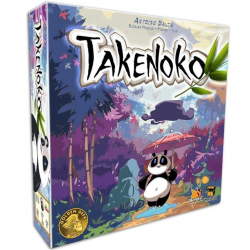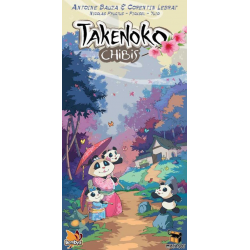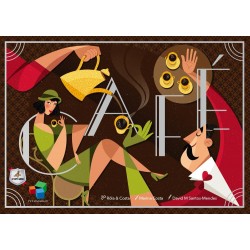No products in the cart.
Active filters
Takenoko
A long time ago at the Japanese Imperial court, the Chinese Emperor offered a giant panda bear as a symbol of peace to the Japanese Emperor. Since then, the Japanese Emperor has entrusted his court members (the players) with the difficult task of caring for the animal by tending to his bamboo garden.
In Takenoko, the players will cultivate land plots, irrigate them, and grow one of the three species of bamboo (Green, Yellow, and Pink) with the help of the Imperial gardener to maintain this bamboo garden. They will have to bear with the immoderate hunger of this sacred animal for the juicy and tender bamboo. The player who manages his land plots best, growing the most bamboo while feeding the delicate appetite of the panda, will win the game.
Takenoko
A long time ago at the Japanese Imperial court, the Chinese Emperor offered a giant panda bear as a symbol of peace to the Japanese Emperor. Since then, the Japanese Emperor has entrusted his court members (the players) with the difficult task of caring for the animal by tending to his bamboo garden.
Takenoko: Chibis
A long time ago, the Emperor of China offered to the Emperor of Japan a giant panda, a symbol of peace. Your delicate mission: Take care of the animal by planning a bamboo field. Now as a reward for your great work, you are being offered a second panda...a female!
Café New Edition
In 1713, King D. João V ordered Sergeant Melo de Palheta to travel to French Guiana in order to secretly obtain coffee seeds to plant in Brazil. In 1800, Brazil was already one of the largest coffee producers in the world. Drinking coffee became popular in Portuguese culture, and coffee beans from Brazil, Sao Tome and Principe, Angola, and Timor were among the most prized at the turn of the 20th century. In this game, players run companies that produce, process, and sell coffee to the most exclusive coffee shops of the Portuguese Bélle Époque.
This new edition includes the Café: EXPRESSO expansion.
Bohnanza
Bohnanza is the first in the Bohnanza family of games. The cards are colorful depictions of beans in various descriptive poses, and the object is to make coins by planting fields (sets) of these beans and then harvesting them. To help players match their cards up, the game features extensive trading and deal making.










